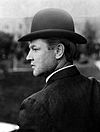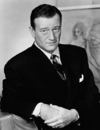Premier of the United Commonwealth
| Premier of the United Commonwealth | |
|---|---|
 | |
| Style |
Mr. Premier (informal) His Excellency (diplomatic) |
| Type | Head of government |
| Reports to | National People's Congress |
| Residence | ?, Chicago |
| Appointer | National People's Congress |
| Formation | 1 May 1921 |
| First holder | Aeneas Warren |
| Deputy | Vice Premier |
The Premier of the United Commonwealth, known also as the Chairman of the Council of People's Commissars or abbreviated to just Premier, and sometimes informally as the Prime Minister, is the head of government of the United Commonwealth, as the overseer of the executive Council of People's Commissars. The Premier is appointed via election from the National People's Congress, following each general election, and is tasked with nominating members to the Council of People's Commissars to form a government. This council is made up of all the various heads of the major departments of the executive branch, known as the People's Commissariats, and is tasked with executing the laws passed by the Congress or the Presidium of the United Commonwealth. As such the Premier and People's Commissars is often comparable to the role of a President and a Cabinet in non-Landonist, presidential republics. The Council of People's Commissars also has broad authority to publish Continental Decrees, which are binding resolutions similar to an executive order, and as such the Premier has the ability to act as a policymaker in his own right.
The Premier of the United Commonwealth has its roots in the provisional executive council overseen by Aeneas Warren during the Continental Revolutionary War. With the declaration of the United Commonwealth via the Union Treaty and the first Constitution of the United Commonwealth, the Council of People's Commissars was established formally in 1921, with Aeneas Warren as its first chairman. Prior to the 1982 Constitution, the Premier could simultaneously be the President or a member of the Presidium, as was the case with Aeneas Warren and Seamus Callahan, however, this ability was curtailed to ensure power is not consolidated behind a single person.
Powers and duties
The premier is the highest administrative position in the Government of the United Commonwealth, and the premier is responsible for administering and organizing the nation's civil bureaucracy. This includes the planning and implementation of national economic and social development plans, as well as the creation of a state budget, which is ratified by the National People's Congress. The premier oversees the various ministries, departments, commissions, and statutory agencies of the federal government, and announces candidacies to the Congress for the positions of Vice Premier, state councilors, and ministerial offices. Unlike a prime minister as seen in the Westminster system, who governs by convention or tradition, the premier is codified into the constitution of the United Commonwealth. The premier is not the commander-in-chief, and therefore does not have command authority over the military of the United Commonwealth, however, commissions regarding national security and mobilization are departments of the executive branch and therefore are controlled by the premier. Since the 1982 Constitution, there has been a separation of powers present between the premier and the President, with the president tasked with gathering the political support necessary for government policy, while the premier is most often tasked with the technical details of implementing that policy.
List of officeholders
| No. | Portrait | Name (Lifespan) |
Term of office and Mandate (Duration in years and days) |
Cabinets | President | Paramount leader | ||
|---|---|---|---|---|---|---|---|---|
| 1 | 
|
Aeneas Warren (1871–1922) |
1 May 1922 |
14 September 1922 |
– | Warren | Himself | |
| 1 year and 136 days | ||||||||
| 2 | 
|
Samuel Gompers (1850–1924) |
16 September 1922 |
20 June 1924 |
– | Gompers | William Z. Foster | Seamus Callahan |
| Coleman Mueller | ||||||||
| 1 year and 278 days | ||||||||
| 3 | 
|
Bill Haywood (1869–1928) |
20 June 1924 |
28 May 1928 |
1924 |
Haywood I | ||
| Seamus Callahan | ||||||||
| 1926 | Haywood II | |||||||
| 3 years and 343 days | ||||||||
| 4 | 
|
Winston Ashtabula (1886–1983) |
28 May 1928 |
25 June 1932 |
1928 | Ashtabula | ||
Seamus Callahan | ||||||||
| 4 years and 29 days | ||||||||
| 5 | 
|
Seamus Callahan (1885–1947) |
25 June 1932 |
1 June 1947 |
1932 | Callahan I | Himself | |
| 1936 | Callahan II | |||||||
| 1940 | Callahan III | |||||||
| 1944 | Callahan IV | |||||||
| 14 years and 344 days | ||||||||
| 6 | 
|
John L. Lewis (1880–1950) |
1 June 1947 |
25 November 1948 |
– | Lewis | ? | Second Triumvirate |
| 1 year and 178 days | ||||||||
| 7 | 
|
William Green (1873–1953) |
25 November 1948 |
5 September 1953 |
1948 | Green I | Darlington Hoopes | |
| Clarence Senior | Amelia Crawford | |||||||
| 1952 | Green II | |||||||
| 4 years and 285 days | ||||||||
| 8 | 
|
Jack Spruance (1904–1979) |
5 September 1953 |
8 October 1970 |
– | Spruance I | ? | |
| Lysander Hughes | ||||||||
| 1956 | Spruance II | Lysander Hughes | ||||||
| 1960 | Spruance III | Rupert Gardner | ||||||
| 1964 | Spruance IV | |||||||
| 1968 | Spruance V | |||||||
| 17 years and 37 days | ||||||||

